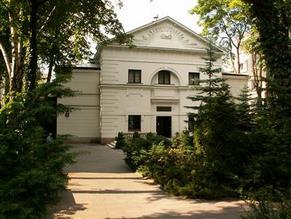|
World Jewish News

The Warsaw Chamber Opera is minuscule, with just 159 seats in a former church in the centre of the capital.
|
Warsaw Chamber Opera revives work of Holocaust victims
30.11.2011, Culture Almost seven decades after the Holocaust, Warsaw's Chamber Opera is marking its own anniversary with performances of rare works from composers who lost their lives in Nazi Germany's genocide.
The tiny venue, founded in 1961 and already unique for its annual performances of the complete works of Mozart, wants to bring a handful of largely forgotten pieces back into the public eye in a festival running intonext March.
Among them is "Der Kaiser von Atlantis, oder Die Tod-Verweigerung" (The Emperor of Atlantis, or Death's Refusal) by the German-speaking Czech Jew Viktor Ullman.
Ullman, who studied under Austrian master Arnold Schoenberg before World War I, composed the one-act work in 1943 in the Theresienstadt concentration camp.
Located near the Czech capital Prague, Theresienstadt was used as a "show camp" by the occupying Nazis to try to cover up the real nature of the Holocaust.
"The Nazis organized cultural activities in the camp to create the illusion that conditions weren't all that bad, and that the musicians had their own concert venue," the Warsaw Chamber Opera's director Stefan Sutkowski told AFP.
Sutkowski -- also a musicologist and oboist -- is passionate about seeking out little-known or lost works that symbolise the destruction of a generation of Jewish artists.
The style of Ullman's opera swings from Gustav Mahler to Kurt Weill. The libretto by fellow Theresienstadt prisoner Petr Kien is a denunciation of the Nazis, masked as a fairy tale and dream sequence.
Rehearsals of the work were held in the camp until the Nazis finally banned it.
Both Ullman and Kien were later sent to the Auschwitz death camp, where they perished in 1944.
The manuscript survived the war thanks to another Theresienstadt inmate, was rediscovered in London after World War II, and premiered in Amsterdam in 1975.
Rarer still is the ballet-oratorium "Alles durch M.O.W./Matrimonio con variazoni", the only stage work by Polish Jewish composer Jozef Koffler.
"This has never been performed," underlined Sutkowski.
The 1932 work mixes German cabaret and French music hall forms.
"It is one of the most original musical works not only in the Koffler oeuvre, but in all Polish music of the first half of the 20th century", according to musicologist Maciej Golab.
Considered lost, it was finally rediscovered in Berlin in 1993.
In addition to Ullman and Koffler's works, the 50th anniversary festival includes other pieces without Holocaust links, spanning the 20th century.
Among them are rare pieces from Benjamin Britten, Igor Stravinsky and Leos Janacek, not known as traditional crowd-pleasers.
"Contemporary music is not as popular as classical or baroque," said Sutkowski.
The Warsaw Chamber Opera is minuscule, with just 159 seats in a former church in the centre of the capital.
Its size is an advantage, according to Sutkowski.
"The audience are close to the stage, with a very good view all over, and the acoustics are excellent," he said.
For the past 21 years, it has also proven a major draw for tourists and locals alike thanks to its summer Mozart festival, when all of the master's stage works are performed.
Unlike some other music venues, its finances are in good shape.
While revenues are restricted by its size, its running costs are likewise limited because its technical needs are modest, noted Sutkowski.
by: Emmanuel Angleys
EJP
|
|
